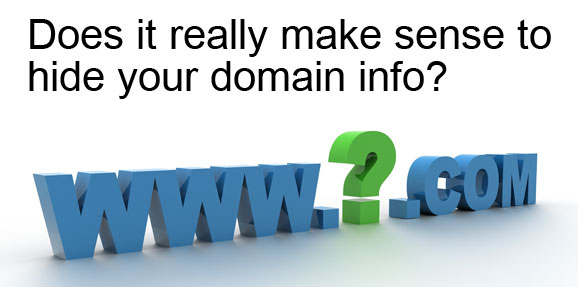
Credit:Fotolia.com
When you register a domain name for your business, your contact information will go into a public directory called a WHOIS database. This is a database of the people or companies that currently control specific domain names. It can be a great tool to find contact information for a business, to identify the owner of a site (such as ensuring a brand site is really owned by the parent company), or even to weed out less legitimate websites.
You will likely be offered the opportunity to purchase yearly privacy protection when you register your domain. This extra yearly fee (although occasionally a free add-on) will hide your company’s contact information in those WHOIS records.
Should you pay for a private domain registration, or not? First let’s look at a few reasons some people and companies do, and some potential downsides you should consider.
Why Some People Choose Private Domain Registrations
Here are just a few reasons some people and businesses choose private domain registrations:
- The website is owned by an individual rather than a business, and they don’t want their home address and personal phone number publicly listed.
- Your company’s domain was registered by a third party (like your Web design company) and you don’t want their contact information publicly tied to your website.
- The site owner is worried about telemarketing or spam increasing if their contact information is available publicly in the WHOIS records.
- You might run a website which targets an audience in a different geographic location, and you don’t want your own location (which might make your site seem irrelevant to the target audience) attached to the public record.
- Spammers and owners of illegal sites often use domain privacy protection to hide their identities to avoid being exposed or even prosecuted easily.
How Private Domain Registrations Might Hurt Your Business

Would you do business with this person? - Credit: Fotolia.com
While there can be some legitimate reasons for using private domain registrations, there are also some potential risks. For example:
- Hiding your contact information can make it look like you have something else to hide. It can be a bad PR move, because hidden registration information can make some people immediately suspicious of the person or group behind a site. This can cost you sales, subscriptions, and sign-ups.
- WHOIS records let your visitors know exactly who to contact about technical problems with the website. If your site goes down or has issues that prevent visitors from finding contact info there, your WHOIS entry can be a good backup. Otherwise you may have a longer delay before problems are brought to your attention.
- WHOIS entries let people know how long you’ve owned your website. That can increase their trust in the information, products, or services offered there. By withholding contact information you immediately counteract that newfound trust. If they care enough to verify the age of the site, chances are good they also care about the registrant info there.
In the end, here’s what it comes down to. If you’re running a simple private site, there’s nothing wrong with getting a private domain registration. But if you’re in business (selling something online, collecting customer data, etc.) then there aren’t many good reasons to hide the fact that you’ve registered the domain. It’s a matter of trust and transparency — things that are always good business. Besides, your contact info should be on your own site anyway in business, so there’s really nothing “private” left to hide.


no comments posted.